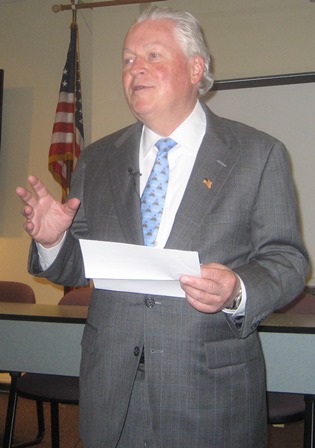
The report represents significantly new and different thinking by Connecticut municipalities in the key state-local arenas –shared services, cost containment, and municipal revenue diversification.
CCM’s Board of Directors established its State-Local Partnership Panel last summer, comprised of municipal CEOs from across Connecticut to develop statewide policies that govern the delivery and financing of municipal services. After months of study, the Panel has completed its work. It recommends a package of proposals that lays the foundation for a vibrant and sustainable future for Connecticut’s towns and cities.
The need to look to the CCM report for answers has become even more urgent as Fairfield and many others towns are scurrying to find a plan of action to deal with Governor Malloy’s new budget proposal; one that that takes significant amounts of state funding away from 138 communities. The stark public education winners and losers—a time when the Education Cost Formula is underfunded by over $600 million—is untenable.
First Selectman Tetreau has stated that he is committed to enacting sustainable change that helps all communities. And that is not all. Governor Malloy’s proposed changes to the Teachers’ Retirement System would require towns to contribute almost $1 billion over two years -- tantamount to a $1 billion bill to property taxpayers across Connecticut. Such a colossal cost transfer—even given the current fiscal realities and the need to look at all areas of state and local spending— only reinforces the urgency to enact the structural changes needed to give municipalities new tools to provide relied-on local services.
“We have all seen a thousand reports over the years on tax reform, regionalism, mandates, property tax relief, etc. This Report is different,” said First Selectman Tetreau. “It’s different because it puts forward new recommendations that haven’t been made before. It’s also different because it is backed by a group of local elected officials from both parties – and from the suburbs, rural areas, and urban areas. And while not every municipal CEO agrees with every idea contained in the report, everyone does agree that, as a body of work, this report deserves to be at the heart of a robust public discussion.”
Joe DeLong, CCM Executive Director, commented, “First Selectman Mike Tetreau devoted extensive time to the working group and his insights and knowledge about local and state government drove many of the key discussions that resulted in proposals contained in the final report.”
Click on this link for the full report: http://www.ccm-ct.org/this-report-is-different. Here are a few examples of some new municipal tools for which the report calls:
- Removing service sharing arrangements as a subject of collective bargaining; state law should be changed so that inter-local agreements or service sharing contracts involving two or more municipalities will override any participating municipality’s charter.
- Allowing general government more control over education expenditures and boards of education; and amending the Municipal Employee Retirement System (MERS) to establish an additional retirement plan for new hires.
- Expanding the sales tax base by repealing 10% of the exemptions for selected consumption categories; reducing the state sales tax rate and levying a statewide local sales tax at the rate of 1%.
- Changing state law and permit municipalities to require on-going fees for the use of the public rights of way.
- Requiring property owners of properties subject to state PILOT reimbursement to pay the difference between the state’s statutory PILOT rate and the amount towns actually receive in state PILOT payments, up to 20% of the mill rate.
- Requiring property assessment services be consolidated and/or shared in Connecticut regions for assessment offices servicing less than 15,000 parcels.
- While the state economy grew by 17% between 2006 and 2015, state expenditures grew by 49%.
- Connecticut local governments are not as large as other states. In 2015, state and local government employment as a percentage of private sector employment ranked 41st compared to other states.
- Excluding education, local general government expenditures in Connecticut rank 50th out of all states, as a percentage of total taxable resources. Local education spending ranks 25th.
- State and Federal payments to local governments are lower in Connecticut than in most other states. Governments in Connecticut stand at a crossroads. For over a decade prior to the Great Recession, governments in the state benefited from a strong economy and stable revenues. But this stability has depended crucially on the local property tax and reliable and adequate state aid. The lack of diversity in revenue sources and uncertainty at the state level are now eroding the capacity of local governments to meet their obligations to the public.
And here are the views of some other municipal officials who worked on the report:
- Mark Boughton, Mayor of Danbury said, “I have no interest in raising taxes. What I like about this report are two things: it’s different, and if we’re able to turn some of these ideas into laws I believe we’ll be able to help reduce property taxes at the local level. I look forward to participating in a robust, very public debate about the ideas included in this document.”
- “These initiatives are clearly different,” noted Deb Hinchey, Mayor of Norwich. “They would break the mold and reset the relationship between the state and local governments. They are long overdue.”
- “The detailed proposals clearly show that town and city leaders can think outside the box and offer real changes that will benefit Connecticut taxpayers across the State,” John Elsesser, Town Manager of Coventry, emphasized.
For more information, please contact Kevin Maloney, CCM (203) 710-3486.